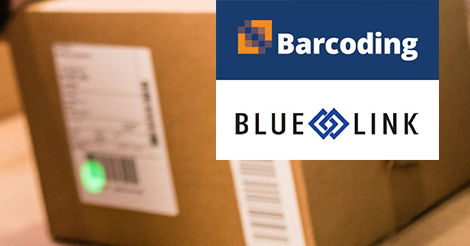A Conversation with Noel McKeon of Barcoding, Inc.
Despite being around for nearly 50 years, there are still some common misconceptions around barcoding systems in warehouse and distribution environments and many companies have yet to take advantage of the many benefits of barcode scanning. There is a lot of power in barcodes – tracking inventory with barcodes helps to reduce human error, improve data collection, validation and management, and eliminate manual tasks, ultimately lowering costs and making your company more profitable and efficient. To discuss some of the benefits of barcode scanning, we spoke with Noel McKeon, Business Development Manager at Barcoding, Inc. Barcoding, Inc. is a certified hardware partner for Blue Link’s Barcode Scanning and Mobile Picking iOS app. As a supply chain automation and innovation company, Barcoding, Inc. helps warehouse operations be more efficient, accurate and connected. Blue Link’s barcode scanning app, combined with hardware from Barcoding, Inc., will allow your warehouse staff to scan and pick barcodes from the warehouse floor, simplifying the receiving, put-away, picking, packing and shipping of inventory.
We spoke with Noel the other day and put together a list of some of the benefits of barcode scanning:
- Barcoding systems work with any budget
- Barcoding systems reduce overall costs
- Barcoding systems automate processes and increase efficiencies.
Barcoding systems work with any budget
Although this was not always the case when barcode scanning systems were first introduced into warehouse management, it is definitely the case today. No business is too small for the use of barcodes as part of their inventory control strategy. Where it used to be that barcode scanning meant the purchase of sophisticated WMS software with ruggedized barcode scanning hardware, barcode scanning functionality is now built-into many ERP solutions and can be used with more economical mobile handheld devices such as Android or iOS. “Many of today's leading business systems (ERP, accounting software, CRM, etc.) offer native support for barcode scanning,” says Noel McKeon. “It's often simply a matter of selecting the right equipment to support the operating environment and some minor configuration tweaks to existing software and a company can be leveraging barcode scanning.” He further recommends that “investing in barcode equipment should be a thoughtful process and not something done through an eCommerce website. Research what capabilities you might need now versus in the future. It's often best to walk before running and you may want to structure the implementation of such technology with a phased roll-out that can support your initial needs, as well as future needs”.
Barcoding systems reduce overall costs
Sure, there will be some upfront costs if you don’t have a barcoding system in place, and there are some time and labour costs when it comes to training staff and maintaining barcodes, but in the long run, a barcoding system will save you money.
First, barcode scanning increases your accuracy, reducing manual errors. No longer does your team have to rely on manual counts, and deciphering handwritten notes. Instead, by electronically tracking inventory, you cut down on picking and packing errors, thus reducing the expenses that arise when an order is picked, packed and shipped incorrectly.
Second, when paired with an ERP system, barcoding can help you lower the cost of capital associated with carrying excess inventory. Together, these systems make it possible to track inventory levels precisely. When you track inventory (what’s coming in, what’s going out and what is currently on shelves) you can avoid over-ordering and the costs associated with holding excess stock.
According to Noel, “There are still many companies today who are operating with manual processes throughout their business. They have employees using pen and paper to record data or dedicated to data entry, keying data into systems, and many times duplicating efforts across multiple systems. The business is working and for the most part, operations are getting the job done, so why change? Why explore the impact of incorporating barcodes into their day-to-day business? The benefits gained from leveraging barcode scanning are numerous and should be examined by each company. Barcode data collection is inherently faster and more accurate. Greater accuracy means better data to drive operational decisions. Barcode scanning can reduce the labour involved with data collection saving your company considerable money. When barcode scanning is combined with existing business systems, data validation can occur. Data validation can ensure that the data a barcode represents drives appropriate behaviours – for example, the correct product is shipped to a customer, or suppliers have sent you exactly what you ordered, etc.”.
Barcoding systems automate processes and increase efficiencies
When you implement wireless barcode scanning as part of an all-in-one ERP system, you simplify and streamline processes in your warehouse. For example, since ERP systems store information in a central database, anyone with proper access can get instant and accurate inventory visibility and availability, making tasks like purchasing or answering customer questions easier and faster. Without barcode scanning, businesses are left with often complicated, multi-step processes that rely on humans to complete each step without error. With a barcoding system and ERP software, scanning a barcode is usually a one-step process that instantly transports information from the scanner to your ERP system. With an automated system, you save time by not re-keying inventory information, searching for items in the warehouse, and correcting errors. This, in turn, can eliminate the need for more warehouse employees to pick, pack and ship orders, thus reducing staff count. If you do need to hire new employees, barcode scanning tools make it easier to onboard staff and increase their productivity.
As Noel added, “as outlined above, barcode scanning offers speed, accuracy, and data validation which helps a warehouse environment to ensure greater control and accuracy over the inventory data that the warehouse is operating against. Warehouse operators can be held to a greater level of accountability and prevented from making certain mistakes. When combined with the right software system, barcode scanning can help ensure that the warehouse is picking orders faster and more accurately, which increases customer satisfaction.”
As you can see, there are many benefits of barcode scanning and every company can take advantage of the functionality offered. No matter how big or small your warehouse operations, barcode scanning is a cost-effective way to become more efficient – with more sophisticated functionality available as your business continues to grow.
Noel McKeon, Barcoding, Inc.
With over 15 years of experience in the AIDC industry, Noel McKeon is an accomplished Business Development professional with extensive experience assisting companies understand, evaluate, and select barcode and RFID focused software solutions that improve and elevate their operations.











